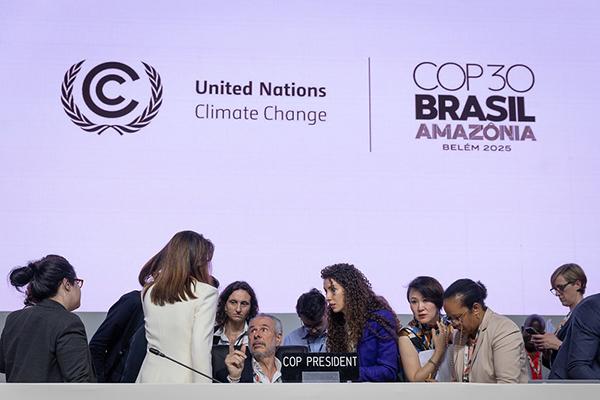Lord Stern responds to COP30 outcome

Commenting on the outcome of the COP30 United Nations climate change summit in Belém, Brazil, Professor Lord Nicholas Stern, Chair of the Grantham Research Institute on Climate Change and the Environment and the Global School of Sustainability at the London School of Economics and Political Science, said:
“This summit demonstrated the continued commitment by all Parties to the Paris Agreement. It has provided a strong foundation for climate action, a clear sense of direction, and has given a framework for the impressive onward advance of renewable energy, and clean innovation more generally.
“The COP30 Brazilian Presidency should be congratulated for creating a positive and welcoming atmosphere, and a sense of coming together, as embodied by the word ‘mutirão’. The Presidency demonstrated an understanding of the risks, and the importance of tropical forests and natural capital.”
“This summit also showed once again that while progress in the formal negotiations can be painfully slow, significant action can be launched alongside the talks by coalitions of the willing, among countries as well as sub-national governments and companies.
“Although some parts of the decisions from this summit have been disappointing, there was some genuine progress, such as the call for a tripling at least of adaptation finance for developing countries by 2035, and the establishment of the Just Transition Mechanism, which should ensure this issue is addressed at future summits.
“The Parties to the Paris Agreement also adopted the Belém Adaptation Indicators to track progress towards the eleven global adaptation targets. It provides a basis for a more comprehensive coverage of adaptation in the second Global Stocktake.
“As with many of the summits since Paris in 2015, there was also significant progress by groups of countries outside the formal negotiations. The creation of the Tropical Forests Forever Facility, which was led by the Brazilian Presidency, is an innovative approach to increasing investment in the protection of the world’s rainforests. The formation of the Carbon Market Coalition could be a step towards stronger carbon pricing schemes around the world.
“Several sector-specific initiatives, such as the Belém Health Action Plan, the Belém 4x Pledge on Sustainable Fuels and the Belém Declaration for Green Industrialization, were also launched as part of the COP30 Presidency’s Action Agenda to highlight implementation in line with goals of the Paris Agreement. Significant progress on power grids for clean energy, electricity storage and energy efficiency were also announced as part of the summit.
“The publication by the COP30 Presidency of the ‘Baku to Belém Roadmap to 1.3T’ lays out a feasible pathway to increasing external finance for developing countries to US$1.3 trillion a year by 2035 to help fund the investment of US3.2 trillion per year required to meet the goals of the Paris Agreement and make progress on the Sustainable Development Goals. As a Co-Chair of the Independent High-Level Expert on Climate Finance, alongside Amar Bhattacharya and Vera Songwe, I was pleased that our report was able to provide an analytical foundation for the roadmap. Importantly, the Roadmap drew on the excellent report of the Circle of Finance Ministers from 35 countries, a group which should continue to engage with future summits, working with the Coalition of Finance Ministers for Climate Action.
“So far 118 countries, representing nearly three-quarters of annual global emissions, have submitted revised plans for action on climate change, showing greater ambition than ever before. Nonetheless these are collectively still only consistent with warming of more than 2 Celsius degrees, so even greater effort is now needed to curb emissions. The COP30 decision recognises the need to limit the overshoot of warming of 1.5 Celsius degrees, which now seems inevitable.
“Despite the disagreements over an explicit plan for the transition away from fossil fuels, the Paris Agreement implicitly mandates this as it is impossible meet its goals without the replacement of dirty energy with clean alternatives across the world. The governments of Colombia and the Netherlands demonstrated clear leadership by announcing they will co-host the First International Conference on the Just Transition Away from Fossil Fuels.
“Importantly, this summit showed continued and strong commitment and support for a multilateral approach to tackling climate change, despite the withdrawal of the United States from the Paris Agreement.”

